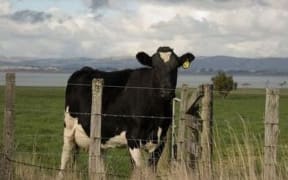DairyNZ is telling farmers to get veterinary advice about the risks to their herds from the tick-borne disease theileria, if they are moving stock this autumn and winter.
Theileria Ikeda, which causes anaemia in cattle and death in some cases, continues to spread since it was first identified in Northland two years ago.
There are now about 1300 infected herds in the North Island and three in the South Island.
DairyNZ veterinarian and technical policy advisor, Nita Harding, said the risk of spreading the disease will increase over the next few months, as a result of normal stock movement.
On top of that, he said, drought conditions in some areas were also increasing the movement of herds for grazing.
"Sharemilkers who are moving farm, will move generally around the first of June, so we can have herds moving long distances over the country, depending on where farmers are going.
We will have young stock that have been, in many cases, grazed off the farm, returning home, so they may have been grazed somewhere with a different theileria status to the home herd. There are also animals that are sold, that will be moved and in some cases we have farmers who will graze cows off the farm between drying off and calving and again, those animals may go somewhere with a different theileria risk status."
The advice to farmers is that farmers they should not bring in pregnant heifers and cows from tick-free areas into designated stable theileria areas without seeking veterinary advice.
Mr Harding said three theileria zones have been designated, based on the pattern of the disease's spread.
A stable zone: the northern part of Waikato and through Auckland into Northland. An an area which is unstable, much of the rest of the North Island and the top part of the South Island, where the disease will come and go, depending on tick activity.
And the bulk of the South Island where, apart from a couple of exceptions, no theileria has been seen.
Once animals have been infected with theileria, it is permanent, but animals previously exposed to the disease can be more resistant to severe clinical effects, such as anaemia.


